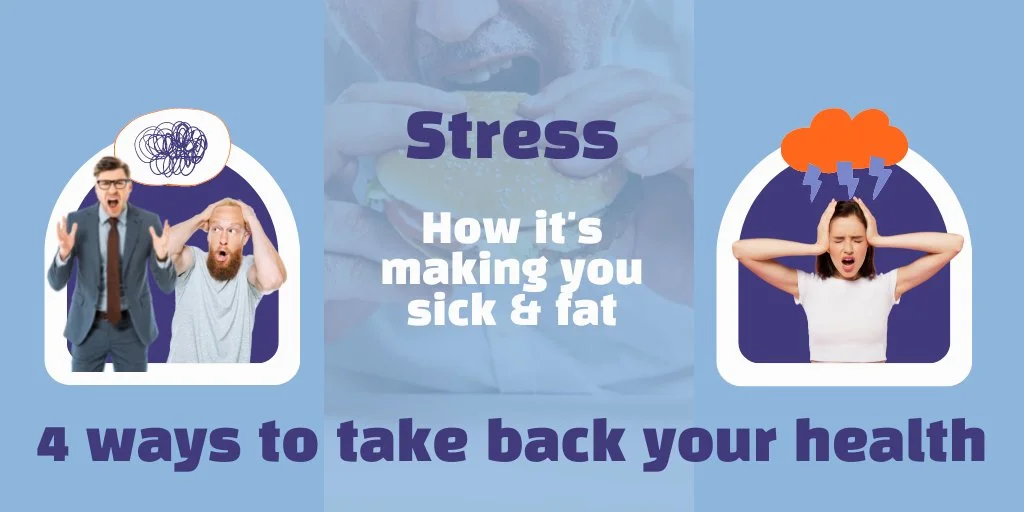Simple Ways to Take Control of Your Health
Life today comes with plenty of challenges that can take a toll on your health. Between processed foods, constant stress, and spending too much time sitting, it’s easy to feel like staying healthy is an uphill battle. The good news is, small, straightforward changes can make a big difference. Let’s break down four key areas that can have a major impact on how you feel every day.
Food: What We Eat and How We Relate to It
The North American food supply has undergone a dramatic transformation, prioritizing convenience and profitability over health. Grocery shelves are packed with processed items loaded with hidden sugars, artificial additives and preservatives, often masking a startling lack of essential nutrients. While these convenience foods save time, they come at a cost, contributing to widespread health issues like obesity, diabetes, and heart disease. As we’ve shifted away from whole, natural foods, the connection between what we eat and how we feel has become increasingly blurred.
Our Relationship with Food
Our relationship with food has also grown more complicated, shaped by emotional triggers and societal pressures. Many turn to food for comfort, using it as a coping mechanism during stressful or emotional times. This has fueled a cycle of emotional eating that rarely addresses the root of our struggles. At the same time, the rise of diet culture has instilled feelings of guilt and shame around eating, leaving people caught between overindulgence and restrictive fads. To truly nourish ourselves, we must move beyond these extremes and build a more balanced, intuitive relationship with food.
Small Things We Can Do to Improve Our Relationship with Food
Mindful eating offers a path toward healing our relationship with food. It encourages us to slow down and savor our meals, paying attention to taste, texture, and how our body feels as we eat. By listening to hunger and fullness cues, we can rebuild trust in our body’s natural signals, freeing ourselves from the constant tug-of-war between overindulgence and restriction. This shift requires intention but can transform mealtimes from moments of stress to opportunities for self-care.
A simple yet powerful step toward healthy food choices is learning to read ingredient labels. Many packaged products marketed as “healthy” often contain additives and sugars that undermine their nutritional value. Opting for fresh, local, and minimally processed, healthy foods not only supports health but also fosters a closer connection to where our food comes from. Shopping at farmers' markets or choosing seasonal produce can make meals more nutrient-rich.
Meal preparation is another vital tool in reclaiming control over food quality. Taking time to plan and prepare meals allows us to avoid the pitfalls of convenience foods while ensuring our choices align with our health goals. Cooking at home provides an opportunity to experiment with flavors and ingredients, turning mealtime into a creative and nourishing experience. Over time, these practices can help shift the focus from food as a source of stress to food as a foundation for health and well-being.
By addressing the challenges of a processed food culture and cultivating a healthier relationship with what we eat, we can begin to take control of our health. Each small change, whether it’s savoring a meal, choosing fresh ingredients, or preparing food with intention, is a step toward a better, more nourishing way of life. In a world filled with quick fixes and instant gratification, reconnecting with the fundamentals of food can offer lasting benefits for both body and mind.
Stress: It’s Making You Sick & Fat
Stress has a profound impact on the body, activating the "fight or flight" response, which is meant to protect us in moments of danger. However, when stress becomes chronic, this system remains perpetually engaged, wreaking havoc on our physical and mental health. Prolonged stress contributes to weight gain, particularly around the midsection, by increasing cortisol levels, which promote fat storage. Beyond weight, it weakens the immune system, disrupts digestion, and leaves us more vulnerable to illnesses, fatigue, and mental health challenges like anxiety and depression.
Modern life is a breeding ground for chronic stress. Workplace demands and time scarcity push people to their limits, leaving little room for rest or recovery. The "always-on" culture fueled by technology exacerbates this, with constant notifications and the expectation of immediate responses blurring the boundaries between work and personal life. Financial strain, societal expectations, and an overwhelming flow of information further amplify feelings of stress, creating a cycle that many struggle to break free from.
Effective Stress Management
Managing stress effectively begins with small, intentional changes that help the body reset. Simple techniques like belly breathing and activating the vagus nerve can calm the nervous system, reducing the fight-or-flight response. Establishing boundaries, such as setting designated "off" hours from digital devices or carving out time for activities that bring joy, can also create space for relaxation. These habits not only help reduce stress but also improve focus, energy, and emotional well-being.
Building stress resilience is a long-term strategy that integrates mindfulness, movement, and intentional living. Practices like meditation or journaling allow us to process emotions and stay grounded in the present moment. Physical activity, even in small doses, releases endorphins and relieves tension, making it a powerful antidote to stress. By proactively managing stressors and prioritizing self-care, we can mitigate its negative effects and create a healthier, more balanced life.
Exercise: Small Movements, Big Impact
Exercise is a cornerstone of good health, offering benefits that extend beyond physical fitness. Regular movement enhances mental health by reducing stress and boosting mood through the release of endorphins. Fortunately, even small, everyday activities—such as walking meetings, desk stretches, or choosing stairs over elevators—can make a meaningful difference.
A common misconception is that achieving fitness requires intense workouts, lifting big dumbbells or buying a gym membership, but this isn’t the case. Quality matters more than quantity when it comes to movement. Activities that are enjoyable and functional, like gardening, dancing, or brisk walks, can be just as effective as traditional workouts.
Consistency is the key to long-term fitness; committing to small, regular efforts builds momentum and sustainable habits. This approach emphasizes movement as a lifestyle rather than a chore, making it accessible and rewarding for everyone.
Detoxification: Supporting the Body’s Natural Processes
Detoxification is another essential pillar of health, referring to the body’s natural processes for removing waste and toxins. The liver, kidneys, skin, and digestive system work around the clock to filter out harmful substances, allowing the body to maintain balance. However, in today’s environment, the body is exposed to more toxins than ever before, making it crucial to support these systems through healthy habits. By lightening the load on these organs, we can help them function optimally and reduce the burden of harmful substances.
Every day we are exposed to toxins everywhere, from environmental pollutants and food additives to chemicals in personal care and cleaning products. Even stress acts as a toxin, triggering physiological changes that can disrupt the body’s natural detox processes. While it’s impossible to avoid exposure entirely, awareness and proactive measures can significantly reduce the impact. Choosing natural, non-toxic products and minimizing processed foods are small but powerful steps toward a cleaner lifestyle.
Supporting detoxification doesn’t require expensive cleanses or extreme diets—it’s about making choices that align with the body’s needs. Staying hydrated with plenty of water helps flush out waste, while a diet rich in fiber promotes healthy digestion. Regular sweating, whether through exercise or saunas, assists the skin in eliminating toxins. These simple practices, combined with minimizing exposure to harmful substances, can enhance the body’s natural ability to detoxify, contributing to overall health and vitality.
The Bottom Line: Keep It Simple
Improving your health doesn’t have to be complicated or time-consuming. Small changes, like packing a healthier lunch, cutting back on takeout, taking a quick walk, or just pausing to breathe deeply, can make a real difference. Pick one thing to focus on today and start there—it’s about progress, not perfection. Over time, these small steps can add up to big results, helping you feel stronger and more in control of your well-being.

